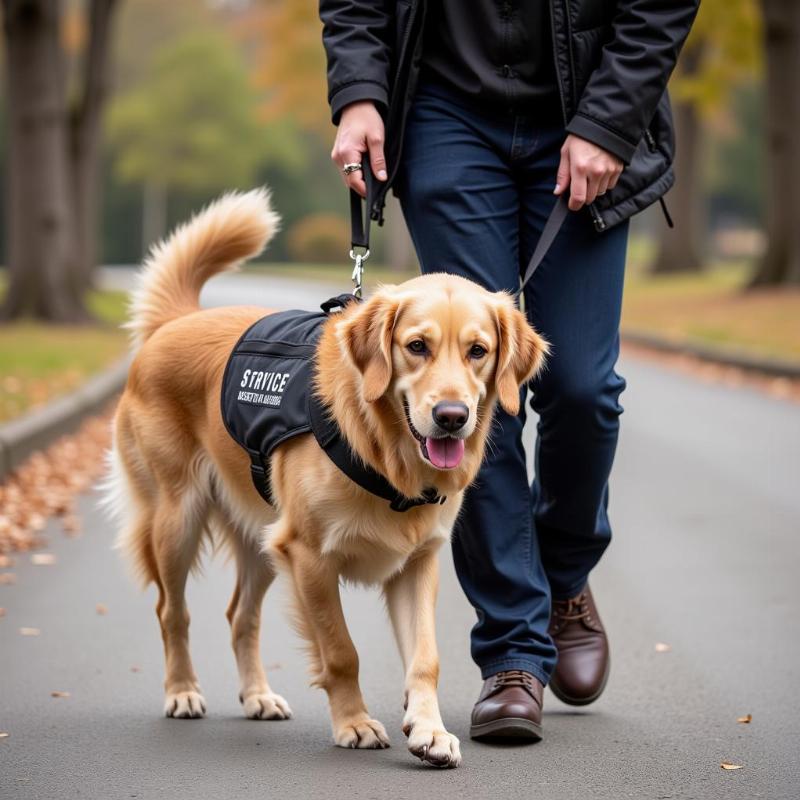A service dog can significantly improve the life of a person with cerebral palsy (CP). These specially trained canines offer practical assistance, boosting independence and enhancing overall well-being. This comprehensive guide will explore the benefits, training, acquisition, and care of service dogs for individuals with cerebral palsy in the United States.
Understanding the Role of a Service Dog for Cerebral Palsy
Service dogs for individuals with CP are trained to perform specific tasks that mitigate the challenges posed by the condition. These tasks can range from retrieving dropped items and opening doors to providing balance support and assisting with mobility. The dog becomes a vital partner, enhancing independence and reducing reliance on others. This partnership fosters self-confidence and empowers individuals with CP to participate more fully in daily life.
 Service dog assisting a person with cerebral palsy
Service dog assisting a person with cerebral palsy
Finding the Right Service Dog for Cerebral Palsy
Locating a reputable service dog organization is paramount. Organizations accredited by Assistance Dogs International (ADI) adhere to rigorous training standards, ensuring the dog’s reliability and suitability. Factors to consider include the organization’s specialization, waiting lists, and the specific needs of the individual with CP.
Training and Specific Tasks
Service dogs for CP receive extensive training tailored to the individual’s unique requirements. Tasks may include picking up objects, turning lights on and off, opening and closing doors, pulling wheelchairs, providing balance support, and even assisting with dressing. The training process is comprehensive, ensuring the dog is well-equipped to handle the specific needs of its handler.
The Financial Aspects of Acquiring a Service Dog
Acquiring a service dog represents a significant financial investment. Costs can vary depending on the organization and the level of training required. Fundraising, grants, and insurance coverage are potential avenues to explore to offset these expenses. Understanding the financial commitment involved is crucial for prospective service dog handlers.
Caring for Your Service Dog
A service dog’s well-being is essential for its effectiveness. Regular veterinary checkups, a balanced diet, proper grooming, and ample exercise are vital. Understanding the dog’s physical and emotional needs contributes to a strong and lasting partnership.
Conclusion
A service dog can profoundly impact the life of a person with cerebral palsy. From increasing independence and mobility to providing emotional support and companionship, these specially trained dogs offer invaluable assistance. By carefully considering the acquisition process, training requirements, and ongoing care, individuals with CP can embark on a fulfilling partnership with a service dog.
FAQ
- How long does it take to train a service dog for cerebral palsy? Training typically takes one to two years.
- Are there financial assistance programs for acquiring a service dog? Yes, various grants and fundraising opportunities exist.
- What breeds are commonly used as service dogs for CP? Golden Retrievers, Labrador Retrievers, and Bernese Mountain Dogs are popular choices.
- Can my current dog be trained as a service dog? Potentially, but it depends on the dog’s temperament, age, and health.
- Where can I find reputable service dog organizations? Assistance Dogs International (ADI) is a great resource.
- What are the legal rights of service dog handlers? The Americans with Disabilities Act (ADA) protects the rights of service dog handlers.
- What are the responsibilities of a service dog handler? Providing proper care, training maintenance, and advocating for the dog’s well-being.
About Beautdogs.us
Beautdogs.us is your premier resource for all things dog-related in the United States. We offer expert advice on dog breeds, care, training, and products. Whether you’re a seasoned dog owner or just starting your journey, Beautdogs.us provides comprehensive and trustworthy information to help you navigate the world of canine companionship. Contact us for expert guidance at [email protected] or call us at +1 501-555-7529.